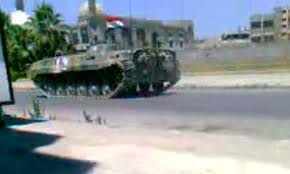 They call it the jineyee, Arabic for “genie” — or crazy female. Standing at about 60 cm high, the rust-colored metal tube doesn’t look like much. But it’s what’s inside that counts: 2 kg of yellow granular explosive material, hooked up to a trigger device that is remotely detonated.
They call it the jineyee, Arabic for “genie” — or crazy female. Standing at about 60 cm high, the rust-colored metal tube doesn’t look like much. But it’s what’s inside that counts: 2 kg of yellow granular explosive material, hooked up to a trigger device that is remotely detonated.
The handful of Free Syrian Army members who gather in this safe house on the Turkish-Syrian border hope that the improvised explosive device (IED) will help even out the odds somewhat in what has become a brutal, vastly asymmetrical civil war in Syria.
On this day, eight of the cylinders were being put together in one of the two rooms of the decrepit stone house with no electricity. It’s in the middle of nowhere (TIME was asked not to provide further details of its location). The bombmaker, a short, bearded man in civilian clothes and latex gloves who looked to be in his early 40s, puffed on a cigarette as he prepared what he called his “special recipe.” He didn’t want to give a name, not even a pseudonym. He’d learned his trade in the military, he said, where he was an explosives engineer “another lifetime” ago. He’d since improved his skills “here and there” and had been a civilian “for a long time.”
This was the first batch of IEDs this group of Syrian military defectors and their civilian partners said they had put together. “We haven’t been doing this for very long,” a former officer said as he inspected the devices. “It took a few tries to get it right, the mix of materials. It was trial and error, and looking some things up on the internet.” A 200-g device had been tested a day earlier. “It destroyed a tree,” the former officer said. “One of these should take out a tank.”
The tanks the rebels have in their sights are in the northern Syrian governorate of Idlib, an area that includes the restive towns of Jabal al-Zawiya and Jisr al-Shughour, which the Syrian military has pounded on and off for months.
The Syrian opposition — both political and military, inside Syria and those in exile — has asked foreign powers and the U.N. to help set up a protected zone. They use different terms — liberated area, humanitarian corridor, no-fly zone, a Syrian Benghazi — but the idea is the same: a patch of territory outside President Bashar Assad’s control that can serve as a headquarters for his enemies.
If it is going to happen — and that’s a big if given that the international community has shown little appetite to protect and enforce such a zone — it will likely be carved out along the Turkish border. Lebanon’s Hizballah-dominated government, after all, is too closely aligned with Syria’s. To the east, Iraq’s Shi’ite-led power brokers and their Iranian allies are unlikely to tolerate such a zone near them, especially because it will abut restive Kurdish or Sunni areas. Jordan’s benevolent police state keeps a tight lid on any form of dissent, and a rebel-held zone next door may destabilize the country, especially as it contends with its own small stirrings of the Arab Spring. Syria’s other border is with Israel.
The dozen or so men in the safe house, some wearing parts of their old military uniforms, others in civilian garb, say they’re not waiting — or expecting — help from anyone, including from the commander of the FSA, Colonel Riad al-Asaad, who along with other officers is sequestered in a camp in southern Turkey, under Turkish protection. “We thank him and other officers for their defection,” a sergeant says, “but he’s my commander,” he says pointing to a captain.
“We are orphans,” says another defector, explaining that they haven’t received technical expertise from other Arabs or anyone else. “No. God is with us,” replies a low-ranking officer. “God is all we need.”
The crop of IEDs isn’t the first to be aimed against loyalist forces in the area. Back in Antakya, a 21-year-old Sunni conscript who defected a week ago from Jabal al-Zawiya still has shrapnel in his left hand from a car bomb he says was planted by the FSA against his loyalist unit. He doesn’t know if it killed anyone. He was quickly taken to Aleppo hospital for treatment. Upon discharge, he defected rather than return to his unit, the Special Forces, 47th Regiment. “The clashes were becoming more intense,” he says of encounters between Syria’s two mismatched armies. “I was scared of the FSA, but now I am proud to be one of them.”
The jineyee hadn’t been out of the bottle and used in the field yet, but all of the men were certain that it would take out a tank. Some of them watched as the bombmaker scooped out the explosive material and poured it into a cylinder. Outside the room, several meters of rust-colored tubes lay outside the old stone house, waiting to be prepared. For now though, the bombmaker was concentrating on the eight cylinders in front of him. “Excuse me,” he said, ushering the others out of the room. “I’ve got a lot of work to do.”
time.com

Leave a Reply
You must be logged in to post a comment.